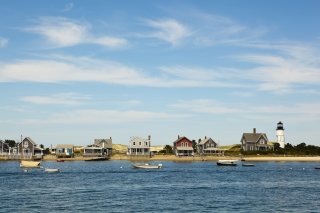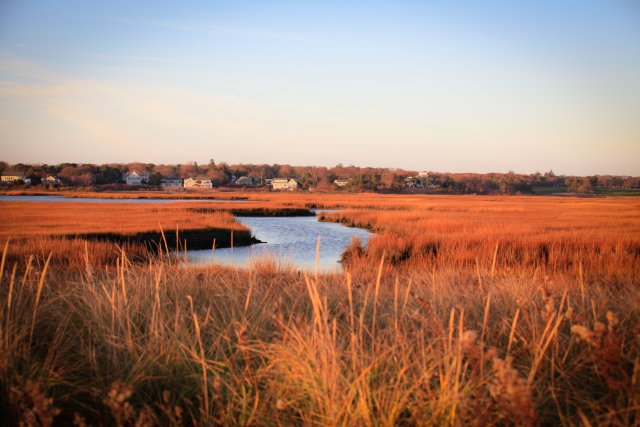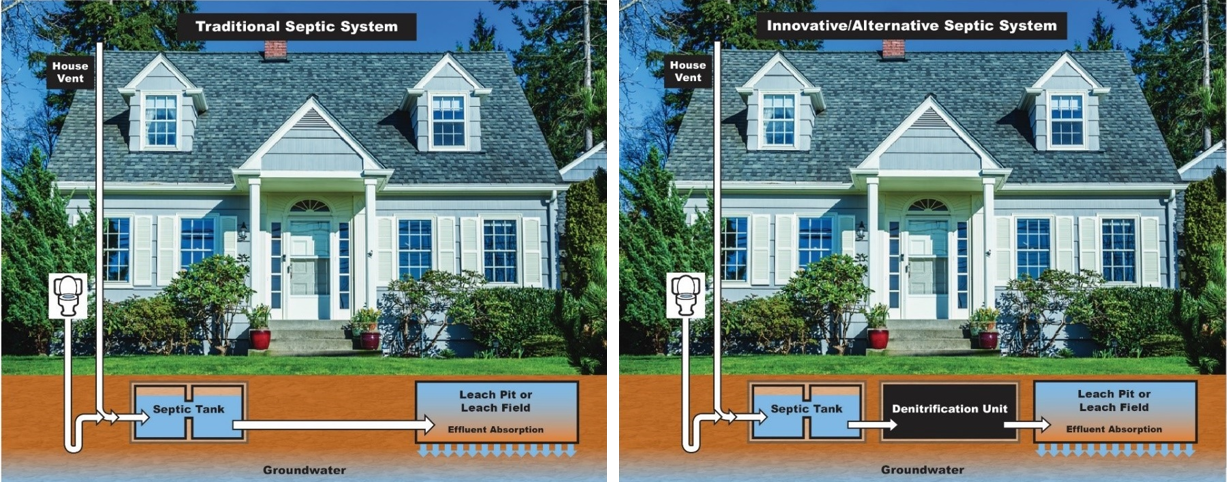Innovative/Alternative Septic Systems

- Environmental Issue
- Project Focus and Research Approach
- Goals and Expected Outcomes
- Project Partners
- Related Resources
Learn more about the overarching project to reduce excess nutrients entering Cape Cod's coastal waters.
A Neighborhood-Scale Demonstration of Enhanced Septic Systems 0n Cape Cod
EPA is partnering with the U.S. Geological Survey (USGS), the Barnstable Clean Water Coalition (BCWC), the Massachusetts Alternative Septic System Test Center (MASSTC), and others to implement a neighborhood-scale demonstration of enhanced innovative/alternative (IA) septic systems, which are designed to prevent excess nutrients, such as nitrogen, from entering estuaries and freshwater ponds in the Cape Cod region.
Enhanced IA septic systems can remove much of the nitrogen in wastewater before it enters surrounding groundwater, estuaries, and ponds. As new designs are developed, system installations and monitoring are needed to evaluate real-world performance before they are considered for broader use. Acceptance of new technologies by homeowners can also depend on social factors, cost, aesthetics, perceived risks, and local ordinances.
Environmental Issue
Nutrients like nitrogen are a natural part of aquatic ecosystems, but excess amounts can cause water systems to become polluted. Excess nitrogen from septic systems and other human activities can threaten estuaries, wetlands, drinking water sources, and freshwater ponds as they contribute to algae blooms; low dissolved oxygen; degradation of seagrass; impaired freshwater; estuarine ecosystems; and in extreme cases, fish kills.
The Three Bays watershed in Barnstable, Massachusetts (Cape Cod region) contains more than 5,000 onsite wastewater treatment systems. Many are traditional septic systems that do little to remove nitrogen from wastewater, which has resulted in excess in the surrounding environment. This excess nitrogen has impacted groundwater, estuaries, and freshwater ponds in the watershed and across the Cape Cod region.
Project Focus and Research Approach
After examining groundwater quality in four candidate Barnstable neighborhoods with elevated nitrogen levels, EPA and partners identified one with high housing density on approximately one quarter-acre, regularly spaced lots for the enhanced IA septic system demonstration project.
BCWC led the conversion and replacement of existing septic systems with new, enhanced IA technologies capable of high removal of nitrogen from wastewater. EPA advised on locations for septic replacement and coordinated subsequent monitoring of system performance.
The enhanced IA septic system upgrades were offered by BCWC to neighborhood homeowners. Each system is being monitored for nitrogen removal performance for approximately three years following installation. Groundwater monitoring wells located up- and downgradient from participating homes are monitored to determine the impact of the new, enhanced IA septic systems on nitrogen in groundwater.
EPA scientists have conducted concurrent research on the social acceptability and user experience of IAs to inform outreach to potential future users. Information gathered from focus groups of IA septic system adopters and non-adopters will be shared with stakeholders in the Cape Cod region and other areas seeking to better manage nitrogen from septic systems.
Goal and Expected Outcomes

This study is part of a larger research effort at EPA that focuses on evaluating interventions to reduce excess nitrogen in the Cape Cod region.
It is expected that this demonstration project will provide the following:
- Performance measures and cost effectiveness information for the enhanced IA septic systems.
- An evaluation of the systems' impact on nitrogen in groundwater.
- Lessons learned that local, state, regional and federal partners can use in watersheds similarly compromised by traditional septic systems.
Project Partners
- Barnstable Clean Water Coalition
- U.S. Geological Survey
- Town of Barnstable
- Massachusetts Department of Environmental Protection
- Massachusetts Alternative Septic System Test Center
- The Nature Conservancy

